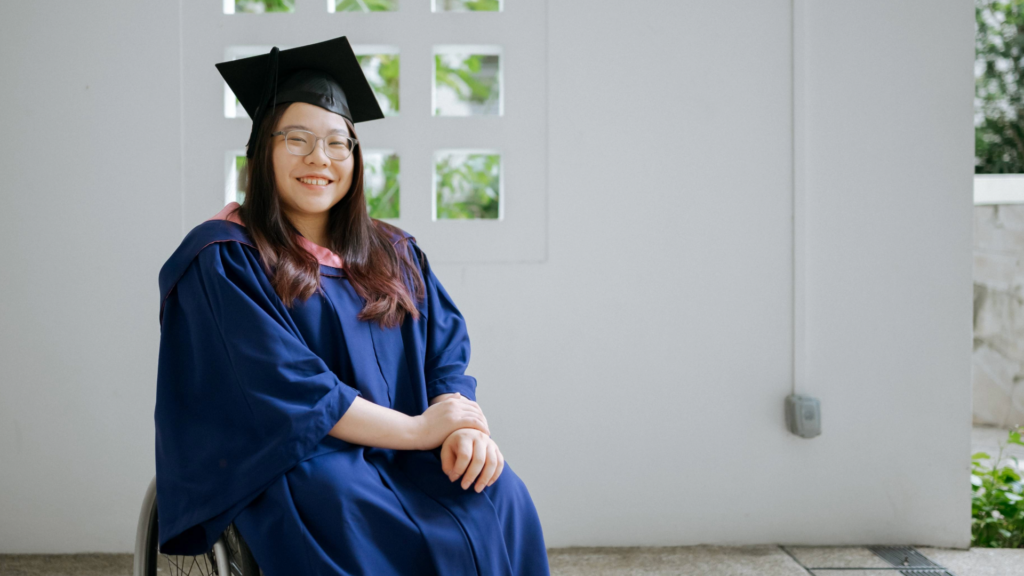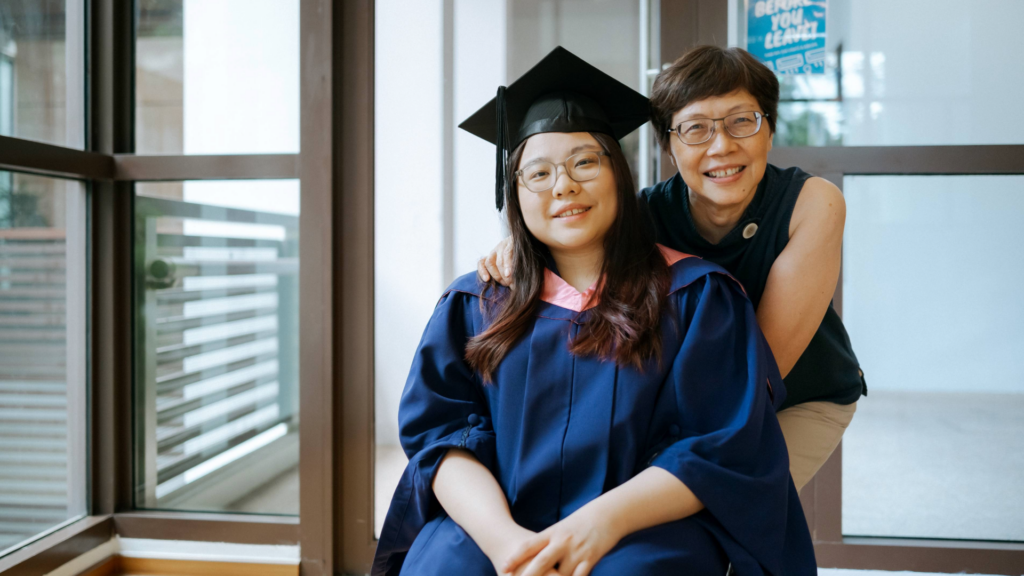Making Her-story: How this History Graduate Turned Barriers into Bridges
July 18, 2024
IN BRIEF | 10 min read
- Rachel Quek (NUS History and College of Alice and Peter Tan '24) held on to the belief that her formative undergraduate years were a time for her to explore who she wanted to, and could, be. Armed with this conviction, she used the challenges that came her way as opportunities to grow and build up her resilience for life after graduation.
“Even at times where I felt that my circumstances and environment were working against me, I knew and trusted that the Student Accessibility Unit was advocating for me and working for my best interest.”
These were the fond words Rachel Quek had for the Office of Student Affairs’ (OSA) Student Accessibility Unit (SAU) when reflecting on her four years as an undergraduate at NUS.
Born with spina bifida and in a wheelchair since she was in primary school, Rachel was used to getting around in her wheelchair long before she first stepped foot into NUS.
Although a seasoned wheelchair user, navigating the hilly terrain of Kent Ridge campus and the decision to live on campus independently had challenged Rachel to step out of her comfort zone.

“I feel very thankful for the professors in NUS’ College of Alice and Peter Tan, Faculty of Arts and Social Sciences and Department of History who were very aware of my needs as a wheelchair user yet did not ‘baby’ me because of it. They were respectful and conscious of the fact that I was a young adult who needed to find my own way around,” she said.
Rachel held on to the belief that her formative undergraduate years were a time for her to explore who she wanted to, and could, be. Armed with this conviction, she used the challenges that came her way as opportunities to grow and build up her resilience for life after graduation.
Thriving within a community of care
The three years she spent as a resident of the College of Alice and Peter Tan (CAPT) were special to Rachel. She enjoyed being able to connect with so many people from different disciplines and who had diverse approaches to undergraduate life.
Rachel had applied to live at CAPT because she was told of a past student with similar needs as hers who was very well taken care of there, and also because of the residential college’s many disabled-friendly features, such as barrier-free and inclusive toilets on every floor.
Staying in a suite with five other girls and learning to care for one another really enriched Rachel’s undergraduate years.
“The connections I made at CAPT formed the nexus of the friendships I forged at NUS. My experience of student life and hobbies centred around CAPT,” said Rachel, who was involved in student interest groups such as Jam City and Guitarpella, and was Vice Project Director of CAPT’s 10th anniversary celebration, CAPT10, in 2022.
The college organised and offered plenty of activities for its residents to bond, learn together or sometimes even to unwind. Rachel recalls how simple social gatherings to enjoy mooncakes or ‘tang yuan’ together were a good way to take a break and gather at the pantry to relax.
While living on campus independently had proven to be one of the best decisions she made, Rachel realises that the decision was probably harder on her parents than it was for her. She said, “Their support and willingness to let go and let me be independent gave me a lot of confidence. They’ve always believed in me, and believed that I would figure things out for myself.”
Punching above her weight
In fact, it was precisely her parents’ encouragement for Rachel to always ‘follow her star’, which led her to pursue a Bachelor of Arts in History at the Faculty of Arts and Social Sciences (FASS).

Being inclined towards subjects in humanities, Rachel pursued pure humanities at A-Levels. It was then that her interest in history grew—she would spend a lot of time reading books, watching videos and listening to podcasts on historical topics.
Keen to explore a different pedagogic approach to history at the university level, Rachel signed up for history courses in her first year and punned, “the rest was history!”
As fate would have it, several of her history professors at FASS were also professors at CAPT, including Dr Daniel Jew whose field of research – particularly on Ancient Greece and Rome – fascinated her. It was no surprise then that she jumped at the opportunity to join Dr Jew to research on the connections between historic Sparta and Singapore as part of the NUS Undergraduate Research Opportunity Programme (UROP).
"I was initially assigned to look through newspaper articles for material that would be relevant and of interest to him for the research. But as I dug deeper, I chanced upon some interesting dynamics of gendered narratives and what Singapore under the British Empire was like.”
These discoveries not only became the topic for her final essay under the UROP, but also formed the basis of what the final research paper she was working on with Dr Jew would be. Because of this, Dr Jew has asked that Rachel be named as lead author for publication in a book chapter within Brill’s Companion to the Spartan Tradition (in press), for the hard work she had put in.
In expressing his admiration for Rachel’s commitment to her work, Dr Jew said, “It is very remarkable to have an undergraduate who is a full co-author for academic work at the lecturer’s level. Rachel is so far the only student I’ve had in 10 years who has contributed to research at this level, before even doing a Masters in History.”
Taking the training wheels off
While her years at NUS were filled with ups and downs, Rachel credits the SAU as well as the rest of the team under OSA for supporting her and many other students with disabilities.
Some older buildings and lecture rooms may not be retrofitted with accessibility features, and moving around the campus could also be challenging during peak hours when the internal shuttle buses are crowded.
“These occurrences taught me be more emotionally resilient, take things in my stride and problem-solve on my feet,” Rachel said.
OSA was also quick to help shift her classes to more disabled-friendly ones, and the University Campus Infrastructure team also arranged for vans to ferry her and other students who had similar transport needs from their halls and residences to class.
“I am nothing but grateful to everyone who’s helped look out for me and supported me in my journey to be more independent,” she reflected. “When I was younger, turning to someone else as an authority figure would have been my first response every time I faced a challenge. The experience at NUS has taught me to look beyond and rise above my circumstances in my own ways.”
While the job hunt was daunting especially since she was aware that recruiters may have had preconceived notions about her disability, she faced this challenge head on, with characteristic grit and determination.
Along with pursuing a career in heritage and history, Rachel hopes to one day complete a Masters in History.
“The more I face adversity, the more I want to push back against it and think, ‘There has to be a way to do it’,” she said.
This story first appeared in NUSNews on 18 July 2024, as part of a series covering Commencement 2024, and celebrating the achievements of NUS graduates from the Class of 2024.

